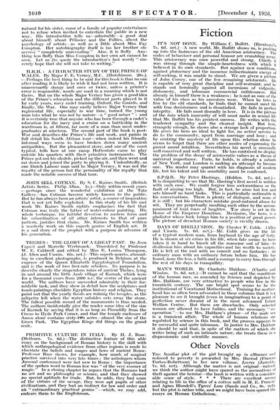Fiction
IT'S NOT DONE. By William C. Bullitt. (Brentano's. 7s. 6d. net.)—A new world, Mr. Bullitt shows us, is pushing up into the fastnesses of the old American aristocracy. The codes of behaviour and personal honour are crumbling away. This aristocracy was once powerful and strong. Chiefly it was strong through the simple-heartedness with which it believed in its own standards. But against new conditions, against plutocracy and the immense indiscriminate energy of self-seeking, it was unable to stand. We are given a picture of John Corsey, one of the few. remaining aristocrats. He is capable of very great discipline and self-restraint, and he stands out heroically against all incursions of vulgarity, dishonesty, and inhuman commercial ruthlessness. But already in himself there is a weakness ; he is not as sure of the value of his class as his ancestors were. When he tries to live by the old standards, he 'finds that he cannot meet life with true decisiveness and is dissatisfied. He fails in perfect integrity. He fails most dismally in love. It is in the picture of the ruin which insecurity of will must make in sexual life that Mr. Bullitt has his greatest success. He writes with the tenderest sympathy and the clearest insight. But here, strangely enough, he shows also a strange lack of proportion. He gives his hero no ideal to fight for, no active service to do to the community, apart from marriage and love ; and by centring the mystery of life upon this relation alone he seems to forget that there are other modes of ,expressing the purest moralNevertheleis his novel is unusually well conceived and well written. -He has contrived to display the problem of the decay of aristocratic values as a theme of universal importance. Paris, he holds, is already a suburb of New York, and London is making an attempt to become one. The reader may quarrel. with his diagnosis of modern life, but his talent and his sensibility must be confessed.






























































 Previous page
Previous page